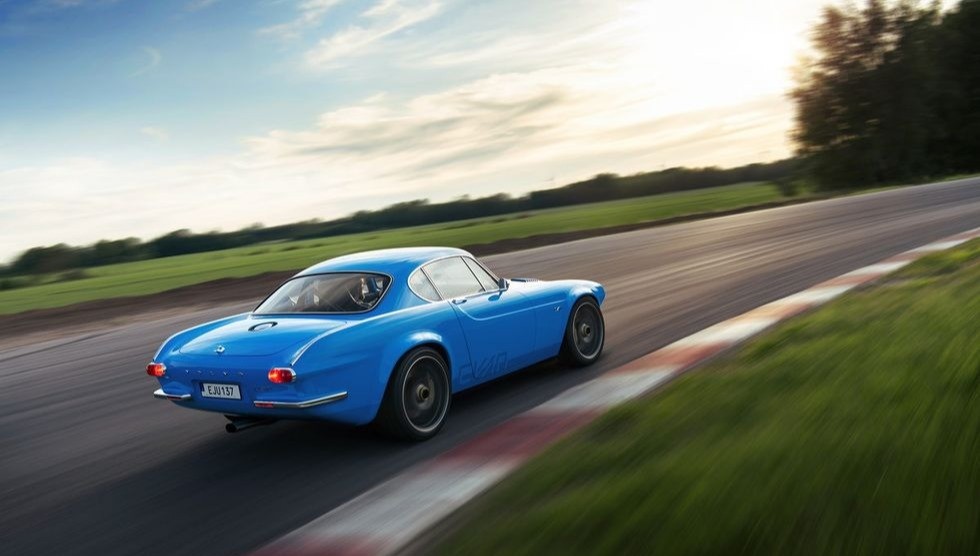Volvo P1800 Lives Again in 413-HP Cyan Racing
The iconic Swedish car of the Sixties will get Volvo's 2.0-liter turbo that the team used in multiple touring-car championships...

Volvo P1800 Lives Again in 413-HP Cyan Racing
The iconic Swedish car of the Sixties will get Volvo's 2.0-liter turbo that the team used in multiple touring-car championships.
- The Volvo P1800 coupe of the 1960s is coming back as a restomod from Cyan Racing.
- The Cyan P1800 will get a 413-hp version of Volvo's turbo four-cylinder engine used in the World Touring Car Championship.
- A small number will be built, although how many—and at what price—has not been announced.
When news dropped that Cyan Racing, the Swedish WTCC team that used to be called Polestar, had created a restomod version of the much-loved 1960s Volvo P1800 coupe, our first thought was that it would certainly be electrically powered. Although Cyan Racing is now a separate organization, Polestar has gone on to become Volvo's in-house division for performance EVs and PHEVs. Ionization also seemed in keeping with the new-for-old spirit of previous electrified classic conversions, including ones from both Jaguar and Aston Martin.
Yet it's not. The Cyan P1800 has instead been given a transplanted version of the Volvo 2.0-liter four-cylinder turbo engine that the team used in multiple WTCC championships. Nor is it just an attention-grabbing concept; Cyan confirms it plans to produce a limited number of the cars for affluent customers.
The original P1800 remains high on the list of iconic Swedish cars, launched in 1960 with the winning combination of Italian design and dependable mechanical components from the more mundane 122 sedan. It is now best remembered as being the car of choice for Roger Moore's dapper pre-Bond TV spy, Simon Templar, in The Saint—and also for the example that the late New York native Irv Gordon drove more than 3.2 million miles, which is recognized as global record mileage for any one-owner car.
Now Cyan's transformation has added some serious performance to the proven traits of dependability and style with the turbo engine tuned to deliver 413 horsepower and rev to 7700 rpm. The team says it also considered using a retuned version of the original motor and also the straight-five and straight-six engines that Volvo used to mount transversely in its front-drive models. The 2.0-liter unit, which is based on the same engine architecture Volvo still uses, was eventually chosen because of its combination of tunability and low mass—something that has helped the P1800 Cyan to have a claimed weight of just 2182 pounds.
Reaching that figure has also required substantial bodywork changes, including the use of both high-strength steel and carbon fiber. The latter material is used to add structural strength through adhesive bonding to the car's metal structure. Strength and safety are further increased with a titanium roll cage. The Cyan is lower and wider due to its dramatically broadened track within its extended wheel arches; the front arches eliminate the broad chromium strake that was one of the most obvious design features of the original car. Suspension is all-independent—the original P1800 had a solid axle at the back—and caster, camber, and toe angles can all be altered. Motorsport-grade dampers have adjustable settings for bump and rebound. Brakes use four-pot calipers front and rear, and 18-inch forged alloy wheels are shod with Pirelli P Zero tires front and rear.
One surprising omission: there are none of the active-safety systems that Volvo puts into all of its more modern cars. The P1800 Cyan does without traction or stability control and doesn't even get ABS, or even a brake booster. It also uses a quickened version of the original car's five-speed manual gearbox, which promises an entirely analog driving experience. Unlike modern Volvos, it also won't get a nannying 112-mph speed limiter, and although Cyan hasn't released any performance figures, the fact it has a power-to-weight ratio similar to that of a Ferrari 458 makes us confident it won't feel slow, although fun is more the point.
Cyan test driver and onetime WTCC champion Thed Bjork is quoted as saying: "The settings of the car are not aimed at fast lap times but rather to deliver an enjoyable and exciting driving experience. I feel my smile widening each time that I control the drift angle of the car through a long turn." That sounds better if you read it out in a Swedish accent.
There's also no word on pricing, availability, or street-legality, but prospective clients are invited to get in touch with Cyan to discuss such matters in greater depth.
This content is imported from {embed-name}. You may be able to find the same content in another format, or you may be able to find more information, at their web site.